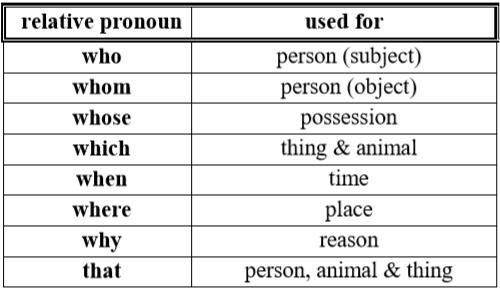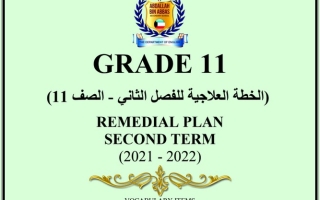مذكرة انجليزي حادي عشر ف2 #م. عبدالله بن عباس 2021 2022
GRAMMAR
A. RELATIVE CLAUSES:
A relative clause is a part of a sentence that gives more information about a preceding noun. This clause is usually introduced by a relative pronoun. There are
types of relative clauses:
1. Defining Relative Clause:
The defining relative clause describes the preceding noun in such a way to distinguish it from other nouns of the same class. In this case, the relative clause is essential in the sentence.
Example: The man who robbed the bank has been arrested.
2. Non-defining Relative Clause:
Non-defining relative clauses are placed after an indefinite noun to add more information about it. They are not essential in the sentence and can be omitted. They are separated from their noun by commas.
Example: Fahad, who lost his job last week, will emigrate to Canada.
B. RELATIVE PRONOUNS:

EXERCISES
A. From a, b, c and d choose the correct answer to complete the following sentences:
1. The house .................. my brother lives has a very beautiful garden.
a. which b. when c. where d. who
2. A man, .......................... looked like a thief, jumped on my neighbour’s fence.
a. how b. who c. which d. when
3. They can't remember the time .................... they first met.
a. when b. where c. which d. why
4. The two books .................. I lost yesterday were found by my friend.
a. when b. which c. where d. who
5. The painter ............. paintings are sold all over the world is going to hold an exposition next month in a famous gallery.
a. why b. whose c. whom d. who
B. From a, b and c, choose the correct answer as required between brackets:
1. A player was rewarded. The player expressed his great joy. (Join with 'who')
a. The player who was rewarded expressed his great joy.
b. The player who expressed his joy was rewarding.
c. The player was rewarded who expressed his joy.
2. These trees will be cut down. These trees are unfruitful. (Join with 'which)
a. These trees are unfruitful which will be cut down.
b. These trees which are unfruitful will which be cut down.
c. These trees which are unfruitful will be cut down.
3. Very few people can remember the day ...................... (Complete)
a. where they first came into primary school.
b. which they first came into primary school.
c. when they first came into primary school.
4. William Shakespeare, ......................., wrote so many plays and poems. (Complete)
a. who was born in 1564 and died in 1616
b. whom was born in 1564 and died in 1616
c. whose was born in 1564 and died in 1616
5. I live in a house. The house is near the seashore. (Join with ‘where')
a. The house I live in where is near the seashore.
b. The house where I live is near the seashore.
c. I live in a house where is near the seashore.
EXERCISE
Fill in the spaces with the most suitable words from the list below:
(electronics / rank / electronic device / portable / consume)
1. Most ................... electronic devices that we use nowadays used to be big and heavy.
2. It has become difficult to ..................... the new mobile phones because each brand has some fantastic features.
3. Doctors often advise people not to………... too much salt and sugar.
4. It is said that people who study ............................... are usually very talented.
LANGUAGE FUNCTIONS
What would you say in the following situations?
1. Your friend wants to know how people can benefit from the media.
……………………………………………………………………………
……………………………………………………………………………
2. Your friend says that most TV programmes are boring.
……………………………………………………………………………
……………………………………………………………………………
3. Your brother says that radio broadcasting should be stopped.
……………………………………………………………………………
……………………………………………………………………………
WRITING AN ARGUMENTATIVE ESSAY
Many people believe that the media play positive roles in our life, whereas many others have an opposite opinion. Plan and write an essay of not less than 14 sentences in which you present the two opinions and their arguments, and you express your own opinion about this issue. OUTLINE
Introduction
……………………………………………………………………………
……………………………………………………………………………
Body 1:
……………………………………………………………………………
……………………………………………………………………………
Body 2
……………………………………………………………………………
……………………………………………………………………………
Conclusion
……………………………………………………………………………
……………………………………………………………………………
GRADE 11 – MODULE 3 – UNIT 7
SUMMARY MAKING (1)
Although only few people are attracted by the gardening activity at the present time, yet the number is growing rapidly. Gardening could be started from a small scale that is home. For this, first you need to choose the plants that grow best in your area, depending on the climate and the soil you are using for them. Thereafter, you should define your budget, which is very important so that you know how much money you can spend. Then select the location which is appropriate for the plants to grow and flourish. Finally, you should get the necessary gardening tools that you are going to use. When you have everything ready, you can start gardening.
Write a four-sentence summary paragraph in response to the following question: - What preparations should a person do before starting gardening?
……………………………………………………………………………
……………………………………………………………………………
……………………………………………………………………………
……………………………………………………………………………
……………………………………………………………………………
EXERCISE
Fill in the spaces with the most suitable words from the list below
(miss out on / provoke / mentally / age-appropriate / inactivity / comedy)
1. TV programmes should be ................................... so that they can satisfy all the audience.
2. Continuous criticism may .............................. a strong feeling of discomfort.
3. ........................... is one of the main negative effects of TV watching.
4. ............................ Old people should stay active both physically and
5. His illness made him ..................................... his best friend’s graduation party
SET BOOK
Answer the following questions:
1. What positive effects does television have on teenagers?
………………………………………………………………………………………
………………………………………………………………………………………
2. What negative effects does television have on teenagers? ………………………………………………………………………………………
………………………………………………………………………………………
3. How can people avoid the negative effects of television?
………………………………………………………………………………………
………………………………………………………………………………………

